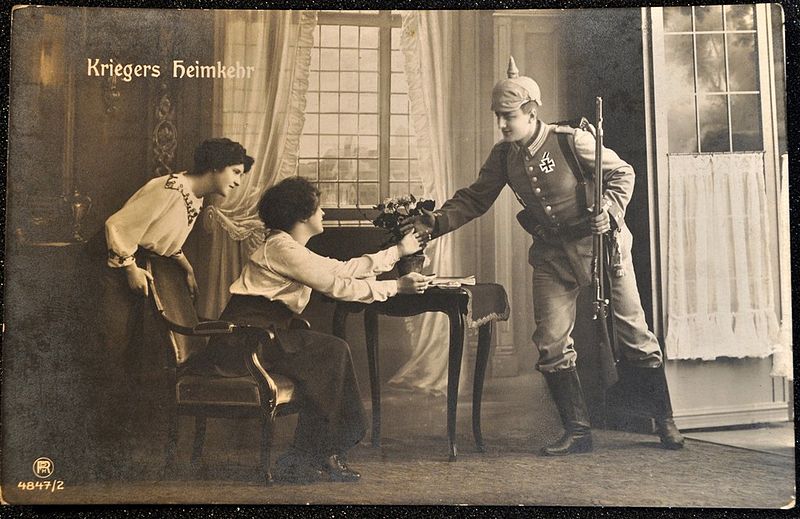Returning Warriors
I’ve been researching the topic of the returning warrior lately, or, I suppose, more specifically, the psyche of the returning warrior.

Ferdinand Leeke – The Warrior’s Return, 1916
I’m about to tackle revisions on a book with a hero who is a veteran of the Peninsular War and Waterloo. You’ve probably seen a ton of such books in the Regency lists, including mine–two of my three published Regencies have returning warriors as heroes.
You’ve also probably seen a ton of SEAL and other military characters on the contemporary romance lists. The hero in my Romancing the Pages anthology story, A Valentine for Lily, is a veteran.
I have another contemporary romance manuscript with a hero who’s a recently returned combat veteran. That story has been sitting for more than a couple of years because the hero has issues, and I want to get the characterization right.

WWI German Postcard, The Warrior’s Homecoming
Characterization that is not too rosy, like this WWI postcard (because that would be conflict-free and boring, right?) and not the insulting stereotype that paints all veterans as troubled victims. As it happens, I’ve been blessed to live most of my life with veterans who served near and sometimes in combat, and I know that PTSD, Post Traumatic Stress Disorder, is often exaggerated and misrepresented. And it’s real also, but mostly not in the stigmatizing way often depicted in news stories.

By Edmund Spencer, Travels in the Western Caucasus 1838
So I want to share some good stuff I’ve found.
From the Wall Street Journal
Author and veteran Phil Klay (Redeployment) says “No, I don’t have post-traumatic stress disorder”. His May 2014 essay “Duty and Pity” is worthwhile reading for anyone researching returning warriors. You can link to his essay here. Bottom line:
War subjects some of its participants to more than any person can bear, and it destroys them. War makes others stronger. For most of us, it leaves a complex legacy. And though many veterans appreciate the well-meaning sentiments behind even the most misdirected pity, I can’t help feeling that all of us, especially those who are struggling, deserve a little less pity and a little more respect.
(Sometimes the WSJ take down links. If that happens, email me and I’ll find a way to get this to you.)
From the Veterans of Foreign Wars Magazine
This magazine is chock full of great articles about military history and military issues. In the August 2013 issue, Kelly Gibson writes about veteran stereotypes:
The idea of the dangerous or unhinged veteran is not a new stereotype—in fact it was even prevalent in relation to Civil War veterans, when civilians worried that soldiers who fought would be unstable and resort to lives of poverty, crime and addiction…With a little research, it’s easy to debunk common stereotypes veterans often fall victim to. In general, when compared to civilian counterparts, veterans are better educated, less likely to be incarcerated, more likely to be employed and commonly become leaders in their communities.
I found this chart from her article to be the most interesting:
A Field Manual for Life After Combat
In looking for books on this subject, I wanted to avoid politicized screeds by journalists, earnest studies by psychologists, and the stuff churned out by government bureaucrats. I can get that content by opening a newspaper or turning on the TV.

I stumbled across The Return, by David J. Danelo in a round-about way. After seeing a post by another romance author writing a story involving PTSD, I pulled up her highly recommended reference book and dug into the reviews. Turns out, the veterans posting reviews didn’t much like it (too political, not accurate) but one reviewer highly recommended Danelo’s book.
Danelo calls this collection of essays “a woodpile of ideas that has fueled the fires of my mind, heart, and spirit for the past decade.” Readable and thought provoking, the short essays (“large logs” and “small kindling” he calls them) are organized in three parts, starting with the concept of Exile, “that unsettling sense of being back but not really being home.”
If you’re creating characters who are returning warriors, I’d recommend you read this book, and if you do, I’d love to hear your opinion about it. My own in-house veteran hasn’t read it yet, but I’ve told him he must because I want his review!
My takeaway is that every returning warrior, in service and after, has a different experience. If my military veteran character is unhinged, crazed, and homicidal, it might make for great conflict, but I’ve created a very rare individual–and I’ve gone to the most convenient, boring cliche. If on the other hand my vet is having issues adjusting to civilian life, I’m not off the mark with Truth, and I still have a lot of room for conflict.
So those are my research recommendations–do you have any for me? Any great books, fiction or nonfiction, that do a good job with this subject or this type of character? Please share!
Illustrations: All three pieces of art with returning warriors are from Wikimedia. The chart is from the Kelly Gibson’s article in the August 2013 issue of VFW Magazine. The book cover is from Amazon.com.

